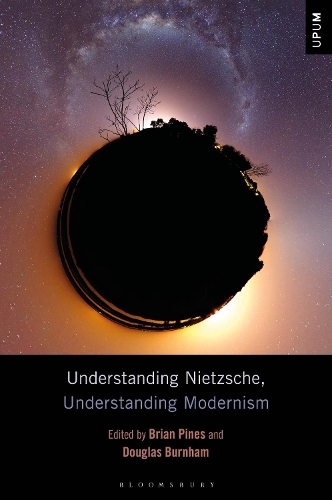
Understanding Nietzsche, Understanding Modernism
(Hardback)
Publishing Details
Understanding Nietzsche, Understanding Modernism
By (Author) Dr Brian Pines
Edited by Professor Douglas Burnham
Bloomsbury Publishing PLC
Bloomsbury Academic USA
21st February 2019
United States
Classifications
Tertiary Education
Non Fiction
Literary theory
Philosophy
193
Physical Properties
Hardback
344
Width 152mm, Height 229mm
626g
Description
Friedrich Nietzsche believed his own work represented the dawning of a new historical era, and, despite the fact that he lived most of his sane life suffering in obscurity, it is not an exaggeration to say that his vision helped lay the foundations for modernism in style, substance and attitude. Nietzsche was himself devoted to the modern, for he reinterpreted every philosophy, every historical figure and event, every movement that came before him. This reconceptualization of the past through new, modern eyes opened up Nietzsches thinking to exploring daring possibilities for the future. This prophetic boldness, which is so unique to his style, seduced the modernist generation across the spectrum. He was read by early Zionists as well as by Nazi racial theorists; by Thomas Mann and as well as by Salvador Dali. His influence stretched from psychoanalysis to anarchist politics. Understanding Nietzsche, Understanding Modernism traces the effect of Nietzsches thinking upon a diverse set of problems: from ontology, to politics, to musical and literary aesthetics. The first section of the volume is a series of essays, each exploring a major work of Nietzsches, explaining its significance while contributing new interpretations of the text. The middle portion connects Nietzsches thought to the various strands of modernism in which it reveals itself. The final section is a glossary of key terms that Nietzsche uses throughout his works. An excellent resource for any scholar attempting to conceptualize the foundations of modernism or the historical importance of Nietzsche, this volume seeks to outline the philosophers works and their reception amongst the generations that immediately followed his passing.
Reviews
Perhaps no other intellectual figure has exerted such a powerful influence on philosophical, literary, and cultural modernism as Friedrich Nietzsche. This volume, edited by Brian Pines and Douglas Burnham, showcases essays that illuminate well the character of this influence and in all its audacious and dazzling glory. * Keith Ansell-Pearson, Professor of Philosophy, University of Warwick, UK *
Approaching the massive profile of Nietzsches work from a plethora of new, partly text-specific, and partly overarching angles, Brian Pines and Douglas Burnham have put together a volume that both suggests and initiates a complex conversation with our twenty-first-century present, an environment still far from being captured in a conceptually transparent and consensual way. They thus decisively leave behind a state of discussion that was locked in the sterile question of whether Nietzsches thought had a place within modernity as a straight line of progress. * Hans Ulrich Gumbrecht, Albert Gurard Professor in Literature, Emeritus, Stanford University, USA *
Author Bio
Brian Pines teaches courses in the Philosophy of Religion at Monterey Peninsula College in California, USA. Douglas Burnham is Professor of Philosophy and Head of the University Graduate School at Staffordshire University, UK. He has written extensively on Nietzsche, including Nietzsche's The Birth of Tragedy: A Reader's Guide (2010) and The Nietzsche Dictionary (2014), both published by Bloomsbury.
